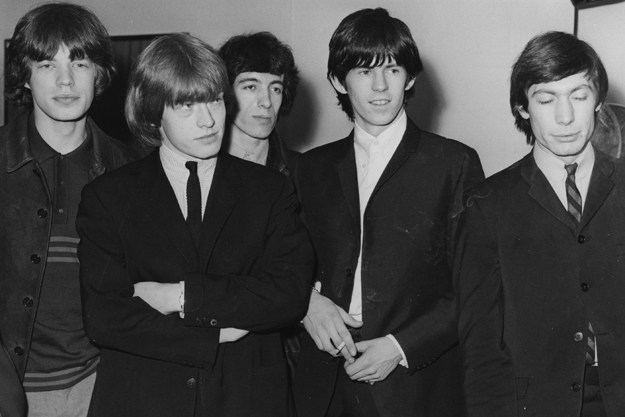This week marks the 50th anniversary of the Rolling Stones’ “(I Can’t Get No) Satisfaction” at number 1 on the US charts. The Stones had already been on the charts, but this was their breakthrough moment. “Satisfaction” is their signature song. For years I thought maybe it was also the greatest rock song of all time. Maybe it’s equal to “Can’t Buy Me Love” by the Beatles, but the latter is much more pop. “Satisfaction” is the simplest expression of rock. The debate goes on and on…
ABKCO is selling a new 12″ vinyl of “Satisfaction” you can get on Amazon, etc. and all the usual places. It’s a cool souvenir whether or not your turntable is set up. Kids, if you’ve got one from Urban Outfitters, you want this record.
In the meantime, here’s the group performing live back in the day, as well as Otis Redding’s amazing cover, which was also a hit:
The Stones:
Otis Redding’s cover version:
The indefatigable Bob Merlis sends this message about “Satisfaction” and its B sides:
The iconic guitar riff that opens the song was composed by Keith Richards who recorded the sequence of notes on a home tape recorder while in a dreamlike state in the middle of the night when the band was on tour in the U.S. After listening to his own recording and devising the song title “(I Can’t Get No) Satisfaction,” he played the riff for Mick Jagger by the pool at the Gulf Motel in Clearwater, FL in early May, 1965. Jagger immediately composed the lyrics.
Having scrapped a version of “Satisfaction” that was recorded at Chess Studios in Chicago on May 10, the group re-recorded the song at RCA Studios in Hollywood, CA on May 12. It was this version that would take over the airwaves and shoot up the charts the following month.
Textured by the aid of a Maestro Fuzz-Tone pedal, Richards’ riff was originally intended to be replaced by a horn section, but the recording sounded complete to producer/manager Andrew Loog Oldham and engineer David Hassinger. Jagger’s lyrics, simultaneously expressing sexual frustration and disdain for consumerist messages, would strike a nerve with the mostly young, rock ‘n’ roll buying public. Ironically, the only two people in the Stones’ camp who were initially against turning “Satisfaction” into a single were Mick Jagger and Keith Richards.
“The Under Assistant West Coast Promotion Man,” credited to Nanker Phelge (a pseudonym used on compositions written by the entire band), is a lighthearted jab at George Sherlock, an employee of London Records at the time, who accompanied the group on their first U.S. tour. The Stones saw Sherlock as a vain, toupee-topped, seersucker suited music biz flunky who was ultimately harmless. In later years, Sherlock expressed pride in having been the subject of the song. Loosely based on Buster Brown’s hit “Fannie Mae,” it is the lyrical content that gives the tune historic importance; the prodding of authority figures through song was almost unprecedented at the time. In the UK, Decca decided to instead use the country-blues composition “The Spider and the Fly” (also by Jagger/Richards) as the B-side to “Satisfaction,” the company assuming that the abundance of American references on “The Under Assistant West Coast Promotion Man” may have gone over the heads of British listeners.
Pressed by Quality Record Pressings in Salina, KS, and limited to 10,000 numbered copies in North America, ABKCO’s “(I Can’t Get No) Satisfaction” 12-inch single will be released a half-century to the day after the landmark song dominated U.S. charts and helped transform the course of pop music history.

